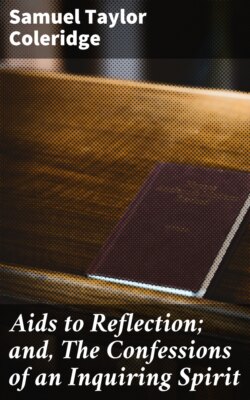Читать книгу Aids to Reflection; and, The Confessions of an Inquiring Spirit - Samuel Taylor Coleridge - Страница 55
На сайте Литреса книга снята с продажи.
Comment.
ОглавлениеFelicity, in its proper sense, is but another word for fortunateness, or happiness; and I can see no advantage in the improper use of words, when proper terms are to be found, but, on the contrary, much mischief. For, by familiarizing the mind to equivocal expressions, that is, such as may be taken in two or more different meanings, we introduce confusion of thought, and furnish the sophist with his best and handiest tools. For the juggle of sophistry consists, for the greater part, in using a word in one sense in the premise, and in another sense in the conclusion. We should accustom ourselves to think, and reason, in precise and stedfast terms; even when custom, or the deficiency, or the corruption of the language will not permit the same strictness in speaking. The mathematician finds this so necessary to the truths which he is seeking, that his science begins with, and is founded on, the definition of his terms. The botanist, the chemist, the anatomist, &c., feel and submit to this necessity at all costs, even at the risk of exposing their several pursuits to the ridicule of the many, by technical terms, hard to be remembered, and alike quarrelsome to the ear and the tongue. In the business of moral and religious reflection, in the acquisition of clear and distinct conceptions of our duties, and of the relations in which we stand to God, our neighbour, and ourselves, no such difficulties occur. At the utmost we have only to rescue words, already existing and familiar, from the false or vague meanings imposed on them by carelessness, or by the clipping and debasing misusage of the market. And surely happiness, duty, faith, truth, and final blessedness, are matters of deeper and dearer interest for all men, than circles to the geometrician, or the characters of plants to the botanist, or the affinities and combining principle of the elements of bodies to the chemist, or even than the mechanism (fearful and wonderful though it be!) of the perishable Tabernacle of the Soul can be to the anatomist. Among the aids to reflection, place the following maxim prominent: let distinctness in expression advance side by side with distinction in thought. For one useless subtlety in our elder divines and moralists, I will produce ten sophisms of equivocation in the writings of our modern preceptors: and for one error resulting from excess in distinguishing the indifferent, I would show ten mischievous delusions from the habit of confounding the diverse. Whether you are reflecting for yourself, or reasoning with another, make it a rule to ask yourself the precise meaning of the word, on which the point in question appears to turn; and if it may be (that is, by writers of authority has been) used in several senses, then ask which of these the word is at present intended to convey. By this mean, and scarcely without it, you will at length acquire a facility in detecting the quid pro quo. And believe me, in so doing you will enable yourself to disarm and expose four-fifths of the main arguments of our most renowned irreligious philosophers, ancient and modern. For the quid pro quo is at once the rock and quarry, on and with which the strong-holds of disbelief, materialism, and (more pernicious still) epicurean morality are built.
[39] Apud Ciceronem et Platonem, aliosque ejusmodi scriptores, multa sunt acute dicta, et leniter calentia, sed in iis omnibus hoc non invenio, Venite ad me, &c. [Matt. xii. 28.]
